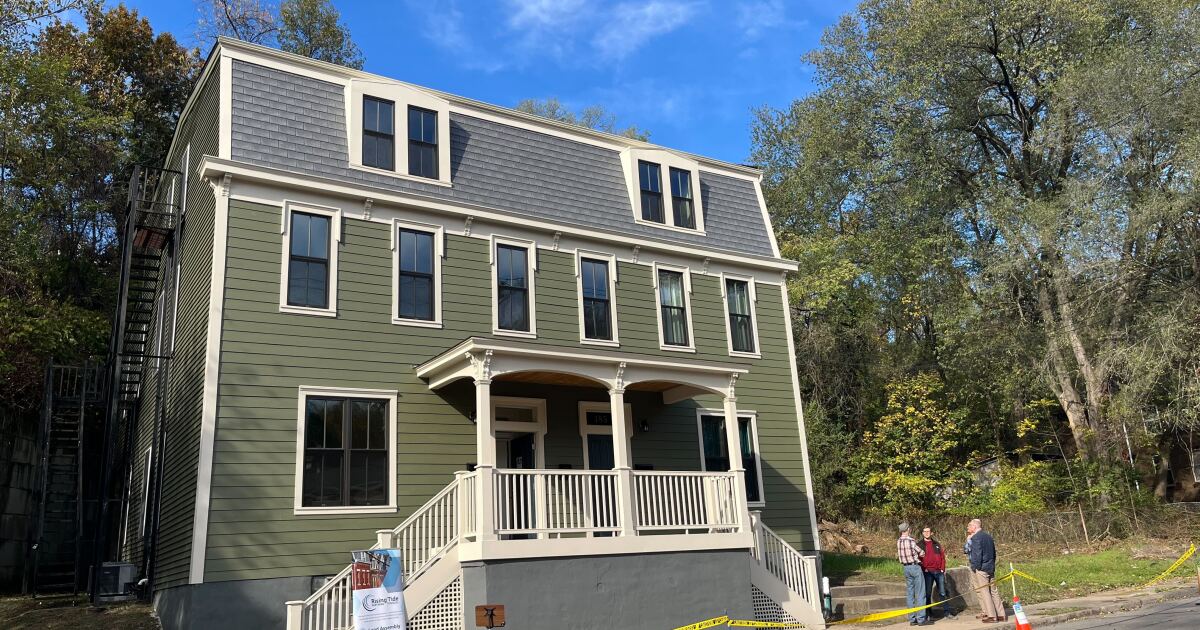A run-down rental property along Flowers Avenue in Hazelwood got more than a fresh coat of paint in its transformation into a crisp green three-story home with a new front porch. The three-unit building is the latest addition to affordable housing in the neighborhood.
“A historic building that has some history attached to it — that’s a great thing to save in a community — a community that’s lost a lot of fabric,” said Sonya Tilghman, executive director of Hazelwood Initiative, a nonprofit community development organization, at an event unveiling the house’s makeover Monday. “So in a neighborhood where things are changing so rapidly to have an addition to that affordable housing mix is great.”
Rising Tide Partners, a Pittsburgh-based nonprofit developer, bought the property from a landlord and got funding to do the historic renovation of the house. It’s now three separate housing units — two of them have three bedrooms and the attic unit has two bedrooms. Families in the neighborhood who have gone through homelessness or have children with special needs will get priority to live in these affordable rentals along with recently completed renovations to two other single family homes nearby.
Families can use Section 8 vouchers to rent a unit and Rising Tide Partners is working with the Housing Authority of the City of Pittsburgh to obtain a project-based Section 8 voucher tied to the unit itself. This would mean that the property manager could work with a family without a voucher to pay an affordable rent.
“Hazelwood needs more affordable homes that are protected long term,” Kendall Pelling, executive director of Rising Tide Partners. “As the neighborhood gets better — and Hazelwood is getting better — there’ll be more opportunities for families who need to rent in Hazelwood to rent in Hazelwood.”
The renovation didn’t come cheap. Rising Tide paid $190,000 to buy the property and spent another $260,000 on renovations. They were able to get funding from a mix of sources including WesBanco Bank, Pennsylvania Housing Finance Agency, Federal Home Loan Bank of Pittsburgh and Landmarks Community Capital Organization.
Playwright August Wilson lived in this house with his family for a few months when he was 13 in 1958. They were one of the first Black families to live on the street but moved to another part of the neighborhood after someone threw a rock through their window along with a racist message, according to a history by JaQuay Carter, president of the Greater Hazelwood Historical Society.
Hazelwood is a neighborhood in flux. Nearly 29% of people in Hazelwood and its neighboring communities lived under 100% of the poverty threshold from 2019-2023 — a 27% from the previous five years, according to an analysis of U.S. Census Bureau data by University of Pittsburgh Center for Social and Urban Research.
At the same time, new development springing up at Hazelwood Green — the former site of the LTV Steel coke works purchased by Pittsburgh foundations — is shaping the neighborhood’s next chapter. The 178-acre complex is the current home to research hubs for Carnegie Mellon University and the University of Pittsburgh, and workspaces for companies and nonprofits focused on robotics and advanced manufacturing. There’s also a mix of new housing — both market-rate and affordable — and a community athletic field in the works.
“But as a neighborhood gets restored, the neighborhood needs to be restored in a way that provides housing for the people who all already live there,” Pelling said. “One of the ways we do that is we try to buy out absentee landlords and folks who are renting shabby houses so that we can protect those families so that the families who are renting shabby places can have their homes fixed. They can stay in the neighborhood in the long run.”

